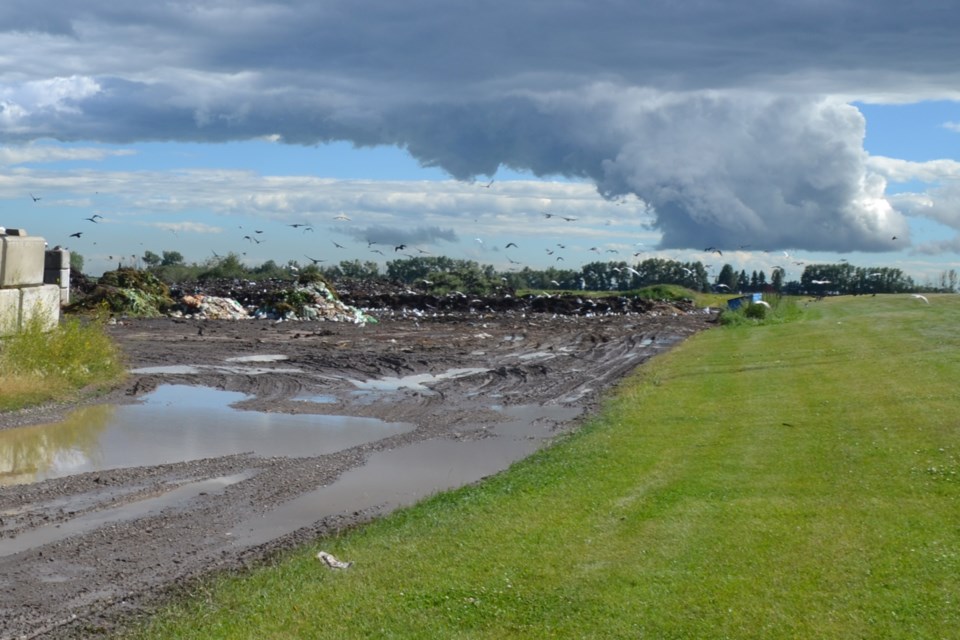OLDS — Complaints from nearby residents about the smell and possible health concerns as well as litter at a compost facility at Olds College appear to have finally had an effect.
The college and the compost facility’s operator, Stoney Soil Products, are working on a “transition plan” which will see the facility moved to another location, according to Blayne Meek, the college’s director of corporate communications and marketing.
She said once that happens, the college will then use the existing compost centre for waste processing from the farm as well as for research.
"With the transition to non-commerical operations, the volume of material being composted will be greatly reduced," she wrote in an email.
However, Meek could not say where it will be relocated or when that might occur.
“I believe those details are still being worked out,” she added.
Meek said residents of Olds and Mountain View County are invited to participate in a virtual community town hall meeting on Sept. 1 at 7 p.m. to discuss the transition plan.
She said the college will post information about the compost centre transition to its website oldscollege.ca.
In 1994, a development permit was issued for the composting facility, allowing it to operate for education and research. An addition was approved in 2001.
A few years ago, Stoney Soil Products was brought in to operate the compost facility.
Nearby residents say that's when the smell and health concerns began to arise.
"Everyone in my area has complained about it," said Doreen Mousek, who lives about a kilometre away from the facility. "It actually makes my throat burn it's so bad."
“It smells like sewer back-up.”
Mousek fears the smell is so bad that the operation must literally be toxic for residents.
She said earlier this year, the problem wasn't so bad, but after the COVID-19 pandemic lockdown was lifted, it seemed to get worse again.
Dennis Anderson, who has 80 acres of land south of the college, also says the stench from the compost facility is awful.
“I live three miles away from it and if I get a north wind blowing, it pretty well gags you in the yard,” he said.
“It stinks that bad. It’s like you left your green bucket under your sink for a month and then opened it up and flipped it around. It’s putrid.”
He too is worried about the facility's health effects because he said the facility attracts hundreds of seagulls, crows and ravens, many of which defecate on his hay bales.
“When I drove by it last night my bet is there was probably 500 to a thousand (seagulls) there and probably another 500 crows and ravens,” he said during an interview. “In the winter, you’ll have a thousand of them there.”
“They’re disease carriers,” he added. “They’re going in there, they’re scrounging in all the compost garbage that’s there and then they go all over the place and crap.”
For the past couple of years, Anderson and others have complained about the problem to Alberta Environment and Mountain View County which issued the development permit for the facility.
Margaretha Bloem, the county’s director of planning and development, is aware of the smell and health concerns arising from the compost facility.
She said the county is working with the college and Stoney Soil Products on a solution.
In an email, Bloem said county officials provided the college, as landowner, with two options to “bring the facility into compliance with the land use bylaw.”
One is to apply for a new development permit for a third party operator that “includes the mitigation of offsite impacts.”
Or secondly, they could “change operation of the facility to comply with the development permits issued.”
In her email, Bloem said a third option would be to relocate the compost facility to a rural location somewhere else in the county.
She noted that if that option is pursued, "zoning approval will be required as well as a development permit that will have to address offsite impacts and concerns raised during the application process."
Bloem warned that a change to the way the facility operates could have an impact on the way the green bin collection program operates in Olds and elselwhere in the county.
That doesn't bother Anderson.
“It’s like, huh, that’s not my problem. I mean, you don’t have to live with that smell every day,” he said.
Bloem said in the meantime, until the college decides which route it wants to pursue in regard to the compost facility “and compliance is achieved, the operator and Olds College have been requested to implement operating changes to mitigate offsite impacts.”
Alberta Environment and Parks (AEP) officials were approached for comment on this story. Christine King, acting assistant director, Environment and Parks communications and public engagement sent this response via email on Monday.
"AEP compliance officers inspected the Olds College compost facility in the spring, and made a number of operational recommendations to the compost facility operator, including updates to the facility’s operations plan, to address the offensive odours issue.
At this time, the Olds College compost facility remains in compliance with the code of practice for compost facilities. Should the offensive odours issue persist, residents should call the Environmental Hotline at 1-800-222-6514."



